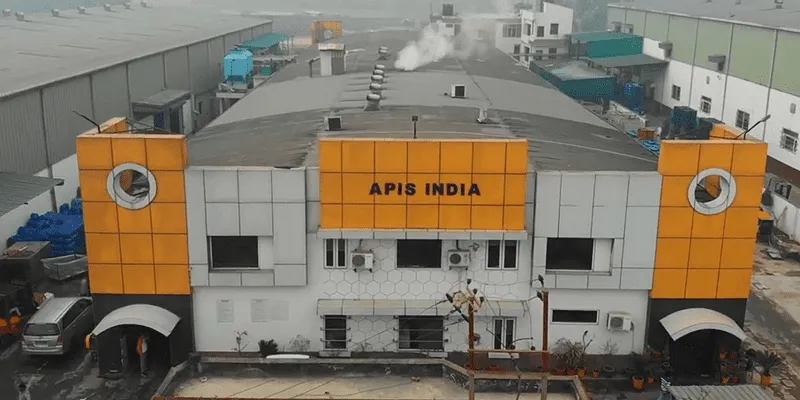How this small trading business grew into a Rs 200 Cr honey brand competing with the likes of Dabur, Patanjali
Apis Honey traces its roots back to 1924 in Delhi when it was set up as a trading business for spices and honey. After shifting its focus to B2B manufacturing for the export market and then B2C for the Indian market, Apis is now competing with established brands such as Dabur and Patanjali.
Beekeeping, or apiculture, is one of the oldest practices in India, but it has gained mainstream popularity in the last few years. Local demand for honey has been growing due to increasing customer preference for natural alternatives to artificial sweeteners and rising awareness of the health benefits of honey.
With their packaged honey products, brands like Dabur and Patanjali have capitalised on this trend and made a name for themselves in the market. However, for many years, it was Delhi-based Apis India that was supplying the honey to Dabur and Patanjali.
After realising there was a big opportunity in the FMCG space for honey, Apis, in 2016, began pivoting to a B2C model. Willing to give up its marquee clients Dabur and Patanjali and become their competitor, Apis started a consumer-facing brand - Apis Himalaya Honey.
“When we started our own brand, we lost business from Dabur and Patanjali. We were also building our distribution network from scratch, which required significant investments. But we were okay with it because we were determined to build an FMCG brand. Our persistence paid off as the Apis Himalaya Honey brand grew in an unprecedented manner,” Pankaj Mishra, CEO, Apis India, tells SMBStory.
From between Rs 130 crore and Rs 140 crore turnover in 2015, Apis reached around Rs 200 crore last year. In the last three years, it has added dates, fruit jams, pickles, ginger garlic paste, green tea, and soya chunks to its product portfolio.
Market growth and competition
Apis is now competing in a fast-growing market. Industry estimates suggest the Indian honey market was worth Rs 1,729 crore in 2019, driven by the popularity of ecommerce. Besides its medicinal applications, the health benefits of honey in a post-COVID world are set to take the local market to around Rs 3,060 crore by 2025.
Dabur and Patanjali remain Apis’ largest competitors. However, Pankaj believes Apis can compete in terms of quality and price of the honey products.
“Our honey comes from a house of experts with over three decades experience in honey sourcing and manufacturing. People recommend Apis Honey over other national brands because we offer quality products at an affordable price. We are also working on many ongoing projects at different stages which will put Apis India in a different trajectory as far as competitive advantage is concerned,” Pankaj says.
His faith stems from Apis’ legacy, which dates back to 1924. Apis founder Vimal Anand’s grandfather had a small business in Delhi, which traded spices, honey, and other food products.
Dabur was a client since then - the trading firm sourced honey from local markets and sold it to Dabur. In 1993, the founders set up their own honey plant in Rajpura in Punjab. The plant used to filter, process, and supply honey to B2B customers in India.

Apis' Himalaya Honey
Focus on exports
At the turn of the new millennium, Vimal and the founders started looking elsewhere. Vimal, who had received formal training in beekeeping and honey processing from University of Warmia Olystyn, Poland, identified a big international opportunity.
He realised the per capita consumption of honey in India was lower than in Europe and the USA, and felt exporting honey to international markets would be more lucrative.
“In 2002, we started exports and private label business for honey. We began building a global presence and a robust manufacturing structure supported by our factory in India. We gradually migrated from a trading firm into an export house for honey,” Pankaj says, adding:
“We forayed into B2B business as a contract manufacturer for other big honey brands. By 2016, we were already handling big volumes. That’s when we saw the Indian market had very few branded national players for honey. We decided to explore this consumer space as we had built expertise in honey sourcing and an established network of beekeepers.”
The B2C business model
Dabur was the dominant honey brand when Apis Himalaya Honey was launched in 2016. But Pankaj says Apis was not fighting a losing battle - it boasted extensive backend integration and trade expertise.
Apis followed a three-level quality control process during the raw material stage, processing and storage stage, and the dispatch stage. It also had a variety of honey available, right from multi-flora honey, eucalyptus honey, and acacia honey to wild forest honey and lychee honey.
Apis also roped in badminton player PV Sindhu as its brand ambassador and began its B2C push. In its bid to capture the organised market for honey and build itself as a national food brand, Apis spent significantly on marketing and brand promotions.
In combination with its largest facility in Roorkee, Uttarakhand, all these factors helped Apis’ FMCG division clock Rs 100 crore turnover.
Market outreach and future plans
Besides the top honey brands, Apis now has competitors in other FMCG sectors as it has diversified into a total of seven FMCG categories. Investments in R&D, innovation, brand building, and market expansion will help Apis stay competitive in all categories, according to Pankaj.
Available across Amazon, Flipkart, Bigbasket, Grofers, etc., as well as Dmart, Hypercity, More, and Big Bazaar, Apis has a strong presence in Andhra Pradesh, Telangana, Karnataka, Tamil Nadu, Maharashtra, and Uttar Pradesh.
In an attempt to capture more customer attention in a hotly-contested market for honey, Apis became an associate sponsor for IPL side Rajasthan Royals in 2020.
“As a headgear sponsor for Rajasthan Royals, we find IPL as a promising property due to its wide reach. We always wanted to associate with the tournament, but our advertising calendar is more skewed towards winter months,” Pankaj says, adding:
“IPL used to happen in summers, and the calendars didn’t match. This year, because of the COVID-19 pandemic and the shift in the IPL period from April to September, we took this opportunity to put the brand out there.”

Apis manufacturing unit in Roorkee, Uttarakhand
The pandemic also resulted in growing demand for honey, which is known as a natural immunity-booster and has numerous applications in medicine. Apis saw demand for its honey products rise and now expects the trend to continue as people adjust their lifestyles in response to the pandemic.
However, Apis is not looking to shut its B2B business - it recently commissioned a new facility in Dubai, which features multiple plants for packaging.
“Our goal is to now maximise the kitchen share of Apis for the consumer. To do this, we have many new products in the pipeline. We expect to take them to market in the next six to eight months,” Pankaj says.
Edited by Megha Reddy








